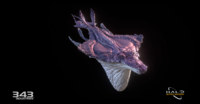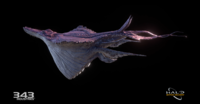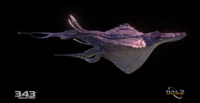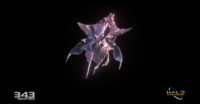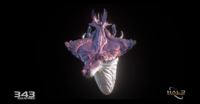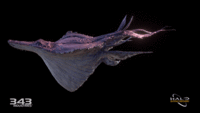Olfmeri
From Halopedia, the Halo wiki
Olfmeri (as they were known to Forerunner Lifeworkers), or "sky leviathans", are among the most mysterious and elusive creatures encountered on various Forerunner installations.[1] They have been described most accurately as "avian cetaceans", despite being wholly alien to Earth's species. Though sharing superficial similarities with the whales of humanity's home world, they are distinguished by their ability to traverse the skies, rather than the oceans, of their locales.[1]
History[edit]
- Olympia Vale: "What in God's name did you say to it?"
- Luther Mann: "I haven't the faintest idea. But I've heard its songs while studying some of the captured audio from the Dawn's time here, and I was able to discern general intent."
- — Doctor Luther Mann explains his attempt at communication between he and a sky leviathan.[2]
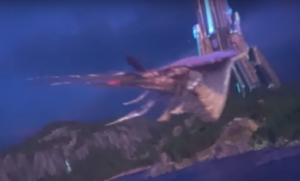
Olfmeri were among the creatures preserved by the Librarian against the firing of the Halo Array in 97,445 BCE.[4][5] Following this destructive event they were seeded upon at least one Halo ring while also being left to flourish on the Ark, Installation 00, far beyond the Milky Way galaxy.[1][Note 1][3][6][7]
In December of 2552 the Charon-class light frigate UNSC Forward Unto Dawn captured audio recordings of olfmeri songs after arriving at the Ark.[2] Soon after this an unfinished Halo ring was fired above the Ark, spelling death for the many sentient creatures which inhabited its surface.[8][9] The Ark's monitor, 000 Tragic Solitude, eventually then began to breed new life forms.[10] Among these were more olfmeri.[2] Then, in March of 2555 a team of humans and Sangheili representing the United Nations Space Command and Swords of Sanghelios, respectively, encountered a group of the leviathans shortly after traveling to the Ark.[2] Respected scientist Doctor Luther Mann had to urge the others not to shoot when one of the olfmeri took notice of the humans and Elites below it and drifted toward them to investigate. Surprisingly, Doctor Mann was able to mimic its singing and appeared to even hold congress with it for a while, thanks to having studied the audio from the Dawn and being able to discern general intent. It soon became clear to the beast that he was not a fellow olfmeri, however, but rather more like a noisy speck, and at that it broke away to rejoin its group.[2] By late 2558 the biological mechanisms behind olfmeri buoyancy were still a mystery to the Office of Naval Intelligence's scientists, though there were no shortage of curious theories.[1][11]
Anatomy and physiology[edit]
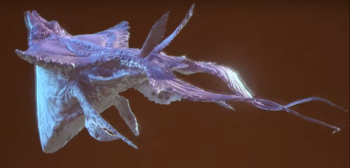
Olfmeri are as large as ocean liners or many of Earth's whales and bear similar features to the aquatic mammals as well.[1][2] Their massive, gorgeous bodies are shaped somewhat like bulbous teardrops with large, toothy mouths which extend across their fronts and about a third of the way down their flanks.[2] Their undersides appear the purest white, often shimmering in the light which reflects off of them. What appear to be wings exist on each side of olfmeri and are known to ripple before propelling them. It is not likely that small arms could do much of anything against one of the hulking creatures.[2]
Unlike the leviathans of Earth's oceans, olfmeri are able to slowly but effortlessly cruise through the air, rather than water.[1][2] They have been observed doing so at just a few dozen meters above the surface of the Ark, but can certainly rise higher into the sky as well.[1][2] If they so choose, they can hover in place.[2] To gain altitude a sky leviathan may tilt its massive body to the side before being propelled upward by its apparent wings—something that only takes moments.[2] The creatures' ability to defy gravity seems impossible given their incredible size and nature, but it is at least known that they stay aloft through buoyant forces produced by some biological mechanisms.[1]
Behavior[edit]
- "The songs don't seem to serve as a language in the same way that words do for us. It conveys feelings, sensations."
- — Doctor Luther Mann tries to explain olfmeri singing as best he can.[2]
Olfmeri are highly social creatures, traveling together in groups and, strikingly, communicating to one another through songs which sound remarkably similar to the noises made by conversing whales on Earth.[2] These songs convey feelings and sensations rather than being used to express a language. At a short distance, the sounds made by olfmeri are loud enough to make human or Sangheili listeners cover their ears. The sky leviathan which took an interest in Luther Mann in 2555 quieted upon first hearing the human make noises which sounded eerily identical to its own, before then focusing intently on him and responding with more song. It appeared to only realize a short time later that he was not a fellow leviathan like itself, at which point it did not care to bother itself with him any longer. Mann had hoped to make it understand his group intended no harm and were peaceful, but he could not say for certain what message he may have actually sent. Diplomat Olympia Vale, at the least, thought it seemed like he'd convinced it of just what he meant to.[2]
Olfmeri seem genuinely harmless, gentle as they are.[2][12] Luther Mann surmised that even if fired upon one would be more likely to be scared than to prove an offensive threat, though he did worry about the likelihood that one might crush he and the rest of his group in the event that it dropped from the sky above them.[2]
Production notes[edit]
- "One of my favorites, the "sky leviathan"—which is basically a giant floating space whale that's flying over the environment. This thing is so cool."
- — Jason Ambler, producer of The Ring Experience, comments on the design of olfmeri.[6]
"Sky leviathans" were originally planned for inclusion in Halo 4, in which they would have been inhabitants of the shield world Requiem.[1][13] 343 Industries artist Paul Richards produced a number of iterative concepts for the creatures' design.[13][14] The version that was eventually selected as representing the true appearance of the olfmeri took inspiration from humpback whales, manta rays, and ocean sunfish as far as its surface detailing was concerned for Paul.[13] Ultimately, they did not appear in the game but were later formally introduced to Halo's canon in the 2015 novel, Halo: Hunters in the Dark.[2] They were then first identified as olfmeri within a Canon Fodder entry which followed the release of the book.[1] Olfmeri were finally visualized within "The Ring Experience", part of Halo: Outpost Discovery.[6]
Gallery[edit]
This image shows some of Paul Richards' concepts.[14]
More of Paul Richards' concepts are shown here.[14]
This artwork of Paul Richards' was used to create the olfmeri that appear in "The Ring Experience" at Halo: Outpost Discovery.[3][13]
This three-dimensional model was created for "The Ring Experience" at Halo: Outpost Discovery.[6]
List of appearances[edit]
- Halo: Hunters in the Dark (First appearance)
- Halo: Outpost Discovery
Notes[edit]
- ^ Halo: Outpost Discovery, a traveling experience canonically set at some point between 2554 and 2557, includes an attraction called "The Ring Experience" which involves viewing a live feed from a OQ-45 Honeybee drone exploring a Halo ring. Multiple olfmeri can be seen in the environment. The planet which the ring is shown orbiting discounts the possibility that it could be Delta or Gamma Halo, and executive producer of The Ring Experience, Jason Ambler, believes it is supposed to be Zeta Halo. If this is the case, the experience cannot be set any earlier than the point in 2555 when the exploration of that installation began. Officially the identity of the installation shown in The Ring Experience is presently undefined by 343 Industries. It should also be noted that the canonical dating of Outpost Discovery may be able to be further narrowed by a display which claims it is believed 343 Guilty Spark was destroyed in 2552. It was in late 2555 that the UNSC first learned of this monitor's survival.
Sources[edit]
- ^ a b c d e f g h i j k l Halo Waypoint: Cannon Fodder - Jurassic Ark
- ^ a b c d e f g h i j k l m n o p q r s Halo: Hunters in the Dark, Chapter 8
- ^ a b c Halo: Outpost Discovery, The Ring Experience
- ^ Halo Waypoint: Cannon Fodder - Array With Words
- ^ Halo Waypoint - Librarian
- ^ a b c d e Halo: Outpost Discovery, The Making of The Ring Experience
- ^ Halo: Renegades, Chapter 13
- ^ Halo: Hunters in the Dark, Chapter 1
- ^ Halo Mythos, page 122
- ^ Halo: Hunters in the Dark, Chapter 18
- ^ Halo Waypoint - Canon Fodder: Outpost Discoveries
- ^ Halo: Hunters in the Dark, Chapter 10
- ^ a b c d Autodestruct Digital - Space Whales 2
- ^ a b c Autodestruct Digital - Space Whales 1
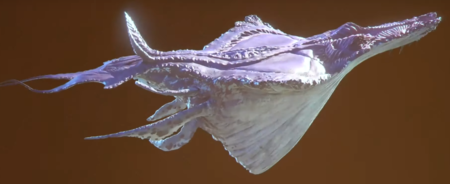
![This image shows some of Paul Richards' concepts.[14]](https://halo.wiki.gallery/images/thumb/4/44/Sky_Leviathan_2.jpg/200px-Sky_Leviathan_2.jpg)
![More of Paul Richards' concepts are shown here.[14]](https://halo.wiki.gallery/images/thumb/8/87/Sky_Leviathan_3.jpg/200px-Sky_Leviathan_3.jpg)
![This artwork of Paul Richards' was used to create the olfmeri that appear in "The Ring Experience" at Halo: Outpost Discovery.[3][13]](https://halo.wiki.gallery/images/thumb/c/ca/Sky_Leviathan_1.jpg/167px-Sky_Leviathan_1.jpg)
![This three-dimensional model was created for "The Ring Experience" at Halo: Outpost Discovery.[6]](https://halo.wiki.gallery/images/thumb/3/32/HOD_Whale3.PNG/200px-HOD_Whale3.PNG)
